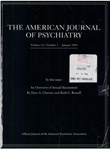The efficacy of brief dynamic psychotherapy: a meta-analysis
Abstract
OBJECTIVE: Insurance companies, legislators, and funding agencies have become increasingly concerned with efficacy and accountability in regard to psychotherapy, and psychodynamic therapy is a primary target of concern because it is widely practiced in outpatient settings. This paper is a meta-analytic review of recent well-controlled studies of the efficacy of brief dynamic therapy. METHOD: The meta-analysis included both published studies, located through an extensive computerized search of psychiatry and psychology journals, and studies reported at conferences. Eleven studies met the inclusion criteria: use of a specific form of short-term dynamic psychotherapy as represented in a treatment manual or manual-like guide; comparison of brief dynamic therapy and a waiting list control condition, nonpsychiatric treatment, alternative psychotherapy, pharmacotherapy, or other form of dynamic therapy; provision of the information necessary for calculation of effect sizes; at least 12 therapy sessions; and therapists who were trained and experienced in brief dynamic therapy. The outcome measures compared were target symptoms, psychiatric symptoms generally, and social functioning. RESULTS: Brief dynamic therapy demonstrated large effects relative to waiting list conditions but only slight superiority to nonpsychiatric treatments. Its effects were about equal to those of other psychotherapies and medication. CONCLUSIONS: These data confirm previous indications that various psychotherapies do not differ in effectiveness, although this finding should not be generalized to all patient populations, outcome measures, and treatment types. Also, the highly controlled conditions of these studies limit conclusions about actual practice. Future studies should address various treatment lengths, follow-up assessments, and specific treatments, patient groups, and outcome measures.
Access content
To read the fulltext, please use one of the options below to sign in or purchase access.- Personal login
- Institutional Login
- Sign in via OpenAthens
- Register for access
-
Please login/register if you wish to pair your device and check access availability.
Not a subscriber?
PsychiatryOnline subscription options offer access to the DSM-5 library, books, journals, CME, and patient resources. This all-in-one virtual library provides psychiatrists and mental health professionals with key resources for diagnosis, treatment, research, and professional development.
Need more help? PsychiatryOnline Customer Service may be reached by emailing [email protected] or by calling 800-368-5777 (in the U.S.) or 703-907-7322 (outside the U.S.).



